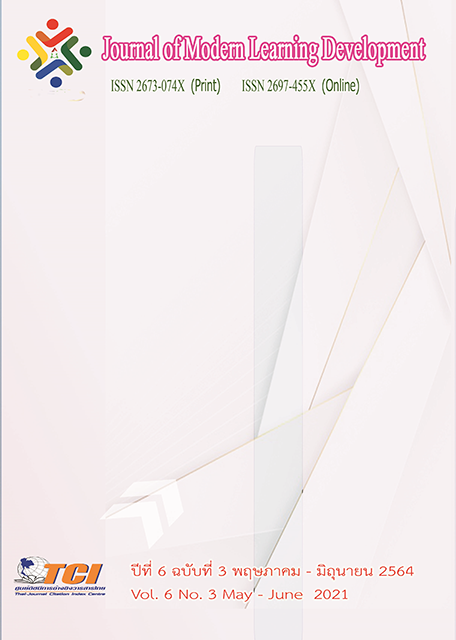The Effects of Gamified Learning Activities on English Learning Achievement of Grade 9 Students at Demonstration School of Suan Sunandha Rajabhat University
Main Article Content
Abstract
This study aimed to 1) compare the English learning achievement between the pre-test and post-test results of grade 9 students who engaged in gamified learning activities and 2) compare the English learning achievement of the experimental group that was taught through gamified learning activities to the controlled group that was taught through 2W3P based learning activities. The cluster random sampling was employed in this study and the participants were seventy-four grade 9 students studying in the 2nd semester of academic year 2020 at Demonstration School of Suan Sunandha Rajabhat University. The experiment was conducted for six weeks. The research instruments were 1. gamified lesson plans, 2. 2W3P based lesson plans, and 3. a learning motivation test. The statistical treatments to test the research’s hypothesis were paired sample t-test and t-test for independent sample. The study revealed that after employing the gamified learning activities, the experimental group’s learning achievement from the post-test was higher than the pre-test at .05 level of statistical significance, and the experimental group’s learning achievement from the post-test was higher than the learning achievement of the controlled group at .05 level of statistical significance.
Article Details
References
เกศนีย์ มากช่วย. (2561). ปัจจัยที่ส่งผลต่อความวิตกกังวลในการพูดภาษาอังกฤษของนักศึกษาชั้นปีที่ 3 หลักสูตรศิลปศาสตรบัณฑิต สาขาวิชาภาษาอังกฤษมหาวิทยาลัยราชภัฏยะลา. เอกสารประกอบการประชุมหาดใหญ่วิชาการระดับชาติและนานาชาติครั้งที่ 9. 20 - 21 กรกฎาคม 2561. สงขลา: มหาวิทยาลัยหาดใหญ่.
จอมพล เล้ารุ่งเรือง. (2561). พฤติกรรมการใช้อินเทอร์เน็ต และผลสัมฤทธิ์ทางการเรียน: กรณีศึกษา: นักศึกษามหาวิทยาลัยเทคโนโลยีราชมงคลพระนคร. วิทยานิพนธ์ปริญญามหาบัณฑิต. วิทยาลัยนวัตกรรม. บัณฑิตวิทยาลัย: มหาวิทยาลัยธรรมศาสตร์.
ธงพล พรหมสาขา. (2559). โครงการการพัฒนาการเรียนรู้ภาษาอังกฤษในสามจังหวัดชายแดนใต้. รายงานการวิจัย. สำนักงานกองทุนสนับสนุนการวิจัย: สำนักงานพัฒนาวิทยาศาสตร์และเทคโนโลยีแห่งชาติ.
นวรัตน์ ศึกษากิจ. (2561). ปัจจัยที่มีผลต่อผลสัมฤทธิ์ทางการเรียนตามความคิดเห็นของนักเรียนระดับประกาศนียบัตรวิชาชีพ สาขาพาณิชยกรรมของโรงเรียนอาชีวศึกษา. วิทยานิพนธ์ปริญญามหาบัณฑิต. บัณฑิตวิทยาลัย: มหาวิทยาลัยสยาม.
พิชญะ โชคพล. (2558). การส่งเสริมพฤติกรรมการเรียนรู้แบบร่วมมือโดยการจัดการเรียนรู้ตามแนวคิดเกมมิฟิเคชัน สำหรับนักเรียนห้องเรียนพิเศษวิทยาศาสตร์ ชั้นมัธยมศึกษาปีที่ 4 โรงเรียนอนุกูลนารี. วิทยานิพนธ์ปริญญามหาบัณฑิต. บัณฑิตวิทยาลัย: มหาวิทยาลัยราชภัฏมหาสารคาม.
วรรณธิดา ยลวิลาศ. (2562). การสร้างแรงจูงใจในการเรียนด้วยเกมมิฟิเคชั่น. วิทยานิพนธ์ปริญญามหาบัณฑิต. คณะศึกษาศาสตร์และนวัตกรรมการศึกษา. บัณฑิตวิทยาลัย: มหาวิทยาลัยกาฬสินธุ์.
สถาบันทดสอบทางการศึกษาแห่งชาติ. (2563). สรุปผลการทดสอบทางการศึกษาระดับชาติขั้นพื้นฐาน
(O-NET) ระดับชั้นมัธยมศึกษาปีที่ 3 ปีการศึกษา 2562. กรุงเทพมหานคร: สถาบันทดสอบทางการศึกษาแห่งชาติ.
สำนักงานเลขาธิการสภาการศึกษา. (2560). โครงการวิจัยเรื่องการกำหนดแนวทางการพัฒนาการศึกษาไทยกับการเตรียมความพร้อมสู่ศตวรรษที่ 21. กรุงเทพมหานคร: กระทรวงศึกษาธิการ.
สิทธิขัย สระตอมฮัมหมัด. (2561). การพัฒนากิจกรรมการเรียนรู้โดยใช้เทคนิคเกมมิฟิเคชัน เพื่อยกระดับผลสัมฤทธิ์ทางการเรียนวิชาคณิตศาสตร์ เรื่องระบบสมการเชิงเส้น ขั้นมัธยมศึกษาปีที่ 3 โรงเรียนสวนกุหลาบวิทยาลัยธนบุรี. รายงานการวิจัย. โรงเรียนสวนกุหลาบวิทยาลัยธนบุรี: สำนักงานเขตพื้นที่การศึกษามัธยมศึกษา เขต 1.
สุพิชญ์กฤตา พักโพธิ์เย็น. (2560). การศึกษาปัจจัยที่ส่งผลต่อผลสัมฤทธิ์ทางการศึกษาของนักศึกษาระดับบัณฑิตศึกษา สาขาวิชาหลักสูตรและการสอน มหาวิทยาลัยธุรกิจบัณฑิตย์. วิทยานิพนธ์ปริญญามหาบัณฑิต. บัณฑิตวิทยาลัย: มหาวิทยาลัยธุรกิจบัณฑิตย์.
Kapp, K. M. (2012). The gamification of learning and instruction: Game-based methods and strategies for training and education. San Francisco: CA L Pfeiffer.
Nader, E. (2017). Impact of Gamification strategy on academic achievement and achievement motivation toward learning. Proceedings of Teaching and Education Conferences. 2017. London: International Institute of Social and Economic Sciences.
Whitton, N., & Moseley, A. (2012). Using games to enhance learning and teaching. NewYork: Routledge.


